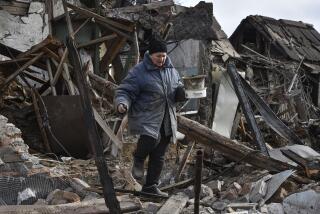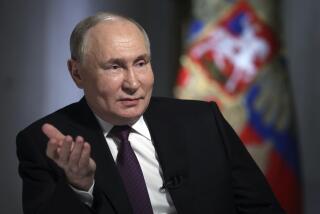Putin orders test of Russian forces amid Ukraine crisis

Russian President Vladimir Putin today ordered the country’s military to conduct troop exercises amid growing tension with neighboring Ukraine.
MOSCOW -- Russian President Vladimir Putin on Wednesday ordered a test of the “battle readiness” of military forces deployed in the western and central areas of the country, a likely show of Kremlin muscle to reassure ethnic Russians in Ukraine that their rights and interests will be defended.
The announcement of the “immediate and thorough” readiness exercises was made by Russian Defense Minister Sergei Shoigu and reported by the Interfax news agency.
“Putin ordered confirmation of troop capabilities for action in the event of a crisis situation that presents a threat to the military security of the country,” as well as anti-terrorism and emergency response readiness, Shoigu was quoted as saying by Interfax.
The readiness test was ordered amid growing tensions in Ukraine between the Russian-allied eastern areas of the restive country and pro-Western political forces now in control of the capital, Kiev, following a rebellion that drove President Viktor Yanukovich to flee his office.
[Updated 9:30 a.m. PST Feb. 26: In a televised reading of the military drills order, Shoigu suggested that the readiness maneuvers running through Monday and involving 150,000 troops, 880 tanks, 90 aircraft and 80 vessels were unrelated to events in Ukraine.]
Acting Ukrainian President Olexandr Turchynov was to address a public rally in Kiev’s Independence Square late Wednesday to announce proposed appointments to an interim Cabinet to govern Ukraine until a presidential election to replace Yanukovich on May 25 and parliamentary elections expected over the summer.
The current parliament, now largely devoid of lawmakers from Yanukovich’s Party of Regions, who either defected to the opposition or retreated to their home bases, was to vote on the nominations Thursday.
Russia had been backing Yanukovich with a promised $15-billion package of loans and energy subsidies after he angered liberal and nationalist politicians in late November by scrapping an association agreement with the European Union. That pact would have enhanced Ukrainian economic ties with the West and opened a path to eventual membership in the EU.
Yanukovich’s rejection of the EU deal in favor of strengthening ties with Russia, for centuries the dominant political force in Ukraine, set off three months of demonstrations that escalated into rioting last week and a bloody crackdown by security forces. At least 82 people died in the confrontations before an EU-brokered peace accord and agreement on early elections.
Pro-Western opposition politicians who led the rebellion have filled the power vacuum in Kiev, which triggered demonstrations in Russian-speaking areas of eastern and southern Ukraine, where industry remains elaborately entwined with Russia’s economy and Moscow keeps its Black Sea fleet based in Sevastopol.
Several dozen Russians worried about their status in a potentially opposition-ruled Ukraine have been demonstrating for the last three days outside public buildings in Sevastopol, Simferopol, Odessa and other southern cities, some demanding that Russia protect them or that the region secede and annex to Russia.
On Wednesday, rival demonstrations involving thousands of Crimean Tatars, who were exiled from Russia to Crimea by dictator Josef Stalin during World War II, pledged allegiance to Kiev and their place within Ukraine.
Shouts of “Ukraine is not Russia” and “Allahu Akbar” could be heard from the crowd of historically Muslim Tatars as they waved the yellow and blue Ukrainian and Tatar flags in defiance of the considerably smaller pro-Russian turnout, according to news agencies and Ukrainian television.
The Kremlin has taken a cautious approach to the evolving crisis in Ukraine, a country of 46 million and arguably Russia’s most important ally as most of Moscow’s exports of natural gas pass through pipelines on Ukrainian territory.
In Moscow, the speaker of the upper house of the Russian parliament dismissed warnings by Russian nationalist politicians that the Kremlin would take military action against Ukraine if it senses any threat to ethnic Russians, who number about 7.5 million, or the nearly one in four Ukrainians who claim Russian as their mother tongue.
“This scenario is impossible,” said Valentina Matvienko, speaker of the Federation Council. “Russia has been stating and reiterating its stance that we have no right and cannot interfere in domestic affairs of a sovereign state. We are for Ukraine as a united state, and there should be no basis for separatist sentiments.”
[For The Record, 9:52 a.m. PST Feb. 26: An earlier version of this post gave the number of Russian speakers in Ukraine as 7.5 million. There are 7.5 million ethnic Russians in the country, but nearly one in four Ukrainians claim Russian as their mother tongue.]
Twitter: @cjwilliamslat
More to Read
Start your day right
Sign up for Essential California for news, features and recommendations from the L.A. Times and beyond in your inbox six days a week.
You may occasionally receive promotional content from the Los Angeles Times.







